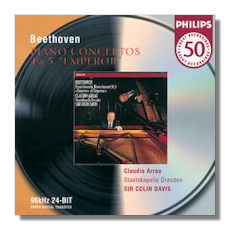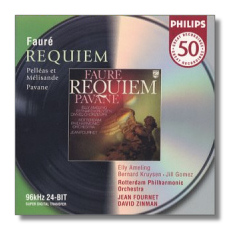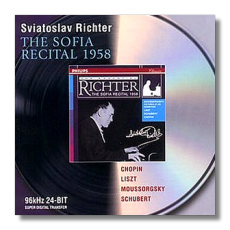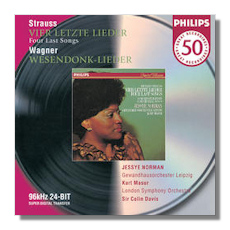
The Internet's Premier Classical Music Source
Related Links
- Latest Reviews
- More Reviews
-
By Composer
-
Collections
DVD & Blu-ray
Books
Concert Reviews
Articles/Interviews
Software
Audio
Search Amazon
Recommended Links
Site News
 CD Review
CD Review
Philips 50

Ludwig van Beethoven
- Piano Concerto #4, Op. 58
- Piano Concerto #5 "Emperor", Op. 73
Claudio Arrau, piano
Staatskapelle Dresden/Colin Davis
Philips 464681-2 DDD 78:25


Gabriel Fauré
- Requiem
- Pavane
- Pelléas et Mélisande *
Elly Ameling & Jill Gomez, sopranos
Bernard Kruysen, baritone
Daniel Chorzempa, organ
Netherlands Radio Chorus
Rotterdam Philharmonic Orchestra/Jean Fournet
* Rotterdam Philharmonic Orchestra/David Zinman
Philips 464701-2 ADD 60:15


Richter - The Sofia Recital 1958
- Modest Mussorgsky: Pictures at an Exhibition
- Franz Schubert:
- Moment musical in C Major, D780 #1
- Impromptu in E Flat Major, D899 #1
- Impromptus in A Flat Major, D899 #2
- Frédéric Chopin: Étude in E Major, Op. 10, #3
- Franz Liszt:
- Deux valses oubliées
- Étude d'execution transcendantes #5 "Feux follets"
- Étude d'execution transcendantes #11 "Harmonies du soir"
- Sergei Rachmaninoff: Prélude in G sharp minor, Op. 32, #13
Sviatoslav Richter, piano
Philips 464734-2 ADD 76:30


- Richard Strauss: Four Last Songs
- Richard Wagner: Wesendonk-Lieder
Jessye Norman, soprano
Gewandhaus Orchestra Leipzig/Kurt Masur
London Symphony Orchestra/Colin Davis
Philips 464742-2 DDD/ADD 47:42
Deutsche Grammophon has its "Originals" and Decca/London its "Legends"; it was only a matter of time before Philips Classics followed suit with a series of its own to proudly highlight its own rich back catalogue. "Philips 50" is, in the words of the label, "a wonderful harvest from 50 years of recording." The label has used the most modern 96kHz, 24-bit technology to remaster recordings that usually sounded pretty good in the first place, and the results are impressive. Reviews of four discs in the initial batch of releases follow.
Claudio Arrau knew a thing or two about playing Beethoven by the time he came to record the Fourth and Fifth Piano Concertos with Colin Davis in 1984. These readings are certainly worthy of inclusion in the Philips 50 series. The collaboration between Arrau and Davis is one of strength and beauty. From the opening notes of the Fourth, one hears the assertiveness – a product of experience? – behind Arrau's playing, and it is fully answered by Davis, and by the orchestra, whose members must have been born to play Beethoven. There isn't a single note that lacks authority and confidence, and yet the smugness of routine never encroaches upon this musicianship. Arrau strides along with Beethoven like a twin Apollo – god-like, and yet never less than human. At the same time, Arrau's tone is a marvel of rounded perfection; each note seems to emit its own light, and each phrase is given the line and classic proportion of a Greek statue. There are moments here and there when one knows that a younger Arrau would have executed a tricky bit of ornamentation more smoothly, but even these moments add to the humanity of the overall conception. Davis leads both works with gloriously expansive tempos. The recorded balance between Davis and Arrau is ideal; this is an early digital recording whose sound stands the test of time.
An hour of music by Gabriel Fauré is an hour spent very gently indeed, and the Philips 50 compilation of two LP releases from 1975 and 1979 is blissful enough. Fournet's idea of the Requiem is that it should be neither too severe nor too sensuous. It is devout – but not damning – and religious without self-righteousness. The work's final revision – the richest of the three versions – is the one that is presented here. Baritone Bernard Kruysen's vibrato throbs with emotion in the "Offertoire" and "Pie Jesu"; Elly Ameling provides contrast with her pure and more celestial tone. The organist adds a palpable foundation to the honest musicianship of the choir and the orchestra. Surprisingly – because I assume that the Netherlands Radio Chorus was still available – Fournet elects to present the Pavane in its version for orchestra alone. Zinman's original release also included Schoenberg's and Sibelius's music for Pelléas et Mélisande, but the Fauré excerpts found here were the best part of the two-LP set. A very young Jill Gomez sings "The King's Three Blind Daughters" very expressively, but performing this song in an English translation is an odd choice. Nevertheless, Zinman captures both Fauré's and Maeterlinck's mysterious beauties, and the orchestra's principal flutist (not identified) glows softly in the "Sicilienne" and "Andante." The engineering is intimate in Pelléas, and more grand but well balanced in the other two works.
Sviatoslav Richter was an experienced pianist in 1958; he was 42 when this Sofia recital was recorded. Still, he was relatively unknown in the West at that time, particularly in the United States, except by reputation. These live recordings rocked the boat when people heard them for the first time, and they continue to do so today. Richter plays with astonishing strength, and yet the chiming quality of his tone prevents listeners' ears from feeling bludgeoned. No one else sounded quite like him, and no one has since. This Sofia recital, recorded in front of an enthusiastic audience, is typical of him. The virtuosity is intact – power, speed, clarity, and control all combine to impress even non-pianophiles. The interpretations ask difficult questions, even if they are playful at times. The Pictures "Promenades" would have put Moussorgsky quite out of breath, if he had to walk from work to work at such a pace. Richter prettifies nothing, and "Old Russia" is never far away in this performance. The three Schubert pieces are full of surprising transitions and turns of phrase; there's no chance that listeners will be lulled into luxurious comfort by what goes on here. The Chopin goes from a whisper to a howl and back again. The fabulous Liszt set impresses us with its emotional changeability; fully warmed-up, Richter's tone transforms the piano into a new instrument capable of both grand and threatening displays and the utmost in privacy. The mysterious little Rachmaninoff Prélude that closes the recital is a like Prospero's last speech in The Tempest. This CD features incredible pianism. Unfortunately, it also features mediocre sound, which Philips hardly can be blamed for, given the recording's origins. The sound of what seems to be an asthmatic heating unit in the recital hall is just one of the hazards that Richter's pianism must negotiate. There's not much that digital remastering can do here.
Each time I hear Jessye Norman sing Richard Strauss's Four Last Songs I am impressed and moved… and perhaps just a little frightened: how can a human being regulate her voice like this? Is there some magic being practiced here? Again and again I marvel at how long and how smooth her phrases are, and how she can do so much, in terms of both quantity and quality, with mere lungfuls of air. Try, for example, the end of "September," where she sings so quietly, yet so penetratingly and so evenly. She seems unaffected by the vagaries of physiology; one wonders, is Jessye Norman really an organ? Her interpretation has something of the superhuman about it. It is as if she has already passed into a higher plane of existence and is recalling mortal limitations from the other side, as it were. Too many words, though: suffice it to say there is nothing quite like Norman's Four Last Songs, and no music-lover should live (or die) without them. They were recorded in 1982 with the infinitely understanding (and unhurried) Kurt Masur and Leipzig's Gewandhaus Orchestra. The five Wesendonk-Lieder were recorded in 1975. It is interesting to compare the two recordings. Here too, Norman's singing is prodigious, but there's nothing of the Strauss's uncanny quality here. It might be that Colin Davis was less of a catalyst than Masur. Nevertheless, who is complaining? Who, at least in the last few decades, has sung this music so well? If one must complain, then complain to Philips for releasing a CD that is less than 48 minutes long. There was no reason to omit the six Strauss orchestral songs that accompanied the original LP and CD releases of the Four Last Songs; they would have fit on this CD easily. Can someone explain this incredible mistake?
Another disappointment in the Philips 50 series so far is the booklet notes. The opportunity has been missed for individuals associated with the recording sessions – performers, producers, or engineers, for example – to reminisce a little and to speculate what made these recordings so special to begin with. Most of us hardly need a rehashed musicological analysis of the "Emperor" Concerto, for example. DG's and Decca's booklets and overall presentation are more attractive than Philips's. Also, there is territory that will remain unmined if the label confines itself to 50 releases; several of the Philips 50 releases so far are reissues of digital recordings that are still in the catalogue. Wouldn't it have been better to have looked harder at some of the older artists – van Beinum, Grumiaux, and Markevitch, for example – whose legacies have not received the attention they deserve? Oh well… you can't have everything, and it is easy enough to be grateful for the treasures that we have been given in this worthwhile series.
Copyright © 2001, Raymond Tuttle




















